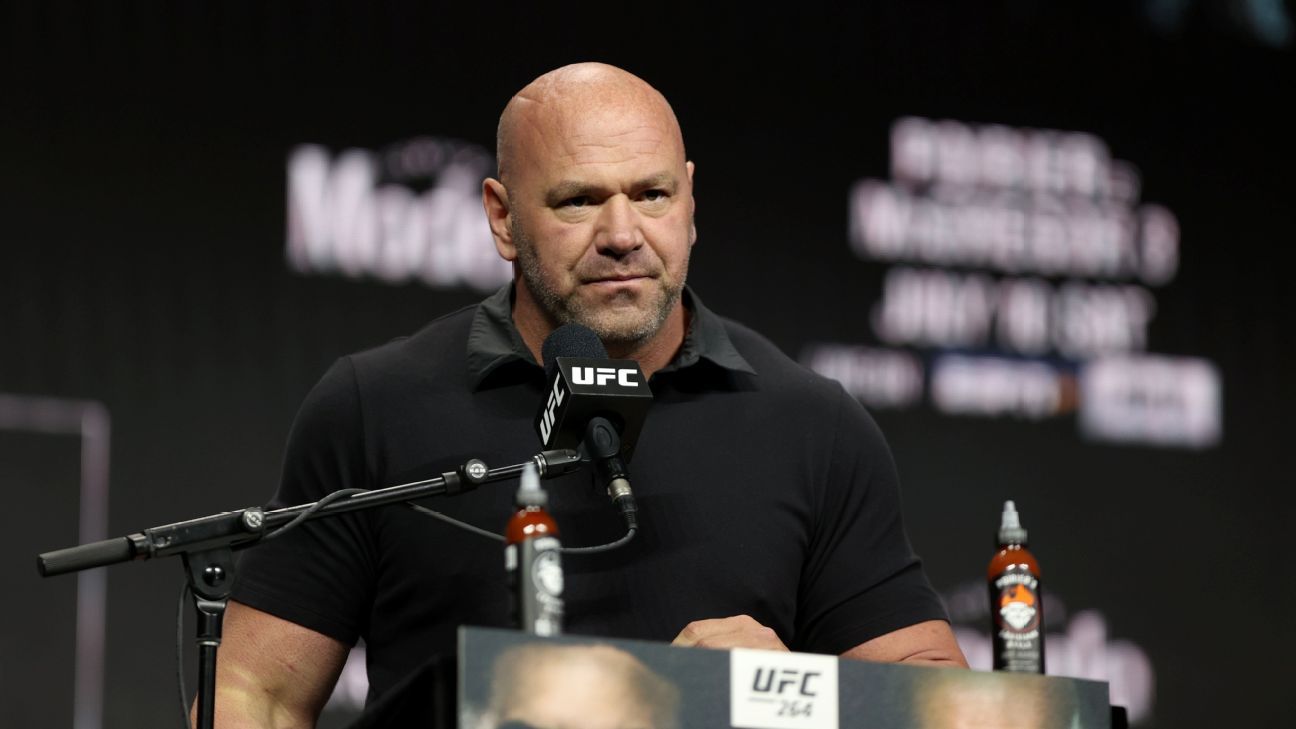UFC president Dana White says fighter pay in the organization won’t change dramatically while he is in his current position, telling GQ in a video published Thursday that he believes fighters “get paid what they’re supposed to get paid.”
The topic of fighter pay has been a hot-button issue in MMA for years and was thrust further into the spotlight by YouTuber-turned-boxer Jake Paul in recent months. White has said he believes high-profile boxers are overpaid and reiterated in the GQ interview that he thinks UFC fighters are paid more reasonably.
“Boxing has absolutely been destroyed because of money and all the things that go on,” White said. “It’s never gonna happen while I’m here. Believe me, these guys get paid what they’re supposed to get paid. They eat what they kill. They get a percentage of the pay-per-view buys. And the money is spread out amongst all the fighters.”
UFC pays fighters around 20% of its revenue, according to data unearthed during the ongoing antitrust lawsuit brought by some former fighters against the promotion. Other major sports leagues, such as the NFL, NBA and MLB, share around half of their revenue with players, but those leagues are unionized and athletes are able to collectively bargain via players’ associations. MMA fighters, and those in the UFC specifically, don’t have anything similar at this time.
“Boxing has absolutely been destroyed, because of money and all the things that go on. It’s never gonna happen while I’m here. Believe me, these guys get paid what they’re supposed to get paid. They eat what they kill. They get a percentage of the pay-per-view buys. And the money is spread out amongst all the fighters.”
Dana White, on pay raises in UFC
UFC fighters are classified as independent contractors, which could make collective bargaining difficult legally. Several attempts at unionizing UFC fighters have failed in the past 10 years, including one by former baseball agent Jeff Borris.
“There aren’t too many things you can talk s— about the UFC about,” White told GQ. “If you look at what we’ve done with the business the last 22 years, it’s incredible. Never been done, ever, the things we’ve done in the fight business. You always have to have something to bitch about, I guess. And fighters always want to make more money.”
White and executives from UFC parent company Endeavor have argued that fighter pay has gone up exponentially over the past decade, though UFC’s revenue has also grown steeply since then.
“No major sports organization pays its athletes as poorly as Dana White & UFC,” Paul tweeted in response to White’s GQ comments. “If u don’t see that then you are one of Dana’s sheeps. They keep talking about selling out 21 events in a row but never talking about raising fighter pay, giving them healthcare & fair revenue split.”
The antitrust lawsuit filed against UFC in 2014 by former fighters, including Cung Le, claims the promotion is a monopoly or a monopsony, controlling the vast majority of the sport’s market share, locking fighters intro restrictive contracts that don’t allow them to test their value on the open market and suppressing wages.
The lawsuit is led by fighters from the MMA Fighters Association, which does not want unionization. Instead, the MMAFA would like boxing’s Muhammad Ali Act, which gives contractual protection to boxers, to be extended to MMA. That extension to MMA was brought up as a bill to the House of Representatives by Rep. Markwayne Mullin, R-Okla., in 2017 but has since been stuck in legislative limbo. The UFC has spent hundreds of thousands lobbying against the potential law.
In 2020, a federal judge said he would grant class certification in the antitrust case, making it a class action that would allow a greater number of fighters to be paid a share of what could be billions in damages. The judge, Richard Boulware, has not made class certification official, and the case seems poised to continue for many more years.
“The UFC has established a pay structure that pays fighters less than 20% of revenue,” MMAFA founder Rob Maysey told ESPN. “The only way to determine what fighters are ‘supposed to get paid’ is to remove the contractual restraints the UFC imposes and bring true competition for fighter services to the market.”
